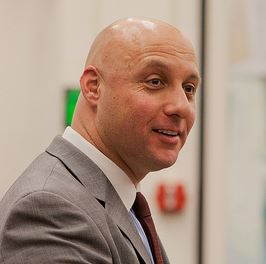From the television news to Facebook, it seems like everyone has an opinion on the NFL and national anthem controversy. On one side of the spectrum, there is the position that standing up during the anthem means ignoring the injustices that are occurring to certain segments of society. Therefore, kneeling or not putting your hand on your heart is a peaceful and appropriate form of recognizing these problems.
On the other side of the spectrum, the argument is that these players should be respectful and thankful to live in a country where they have had the opportunity to get out of poverty and make millions of dollars.
Of course, there is also the position that standing up for the anthem does not mean worshipping the state nor ignoring violations of liberty and justice; rather, it’s a sign of recognizing the ideals that this country was founded on — freedom and liberty.
I am not going to argue for any of these positions. My point is that the government and the private sector need to be separate, other than in cases where the government is the referee in a contract dispute or when the government enforces property rights. President Trump added fuel to the fire with his recent remarks.
Whether or not voicing his opinion was appropriate is another discussion. However, the government definitely should not get involved in NFL policies.
What about the First Amendment?
We need to be careful about arguing that players have a First Amendment right to protest peacefully on the field. They do not. Yes, players can protest if the NFL allows it. However, what if the NFL did not allow this expression on the field? Would that violate the constitutional rights of the players? No.
How about an even more strict policy — what if the NFL restricted such protests by players even when they are off the field? Would this be a violation of the players’ freedom of speech?
Well, if one supports true liberty, freedom of association, and limited government, then the NFL as a private organization has the right to dictate whatever rules they want for their players both on and off the field. But note that players also retain their right to quit the NFL.
The NFL can require whatever they want of their players because the players play at the pleasure of the team owners and the league. It’s not a right to play professional football.
This philosophy would, of course, extend to other businesses as well. For example, if a private university restricted the speech and social media posts of its professors, no doubt those professors would argue that their constitutional right of free speech was being violated.
However, those who support freedom of association could make the point that professors do not have a right to work for that institution. Nor, conversely, does the institution owe a professor a job.
Now, if a public university tried to control off campus speech or social media posts, this would be inappropriate because liberals, conservatives, libertarians, socialists — indeed people of all different races, genders, and religions — are all forced to pay for public institutions. If the government is going to force me (i.e., taxation) to pay for something I don’t support they cannot then prevent me from sharing my opinions.
What is forgotten in the debate of free speech and employment is that private institutions do not owe anyone a position. The debate as to whether or not an employee can do or say something is not the real issue. Whether or not something is considered proper etiquette or appropriate language is in the eye of the beholder. And the government should not legislate etiquette.



